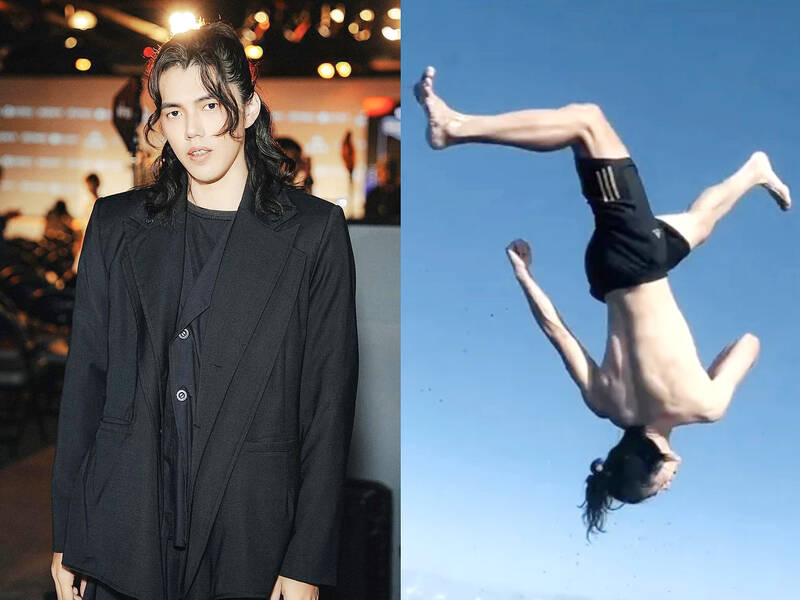A: Wow, YouTuber Xander 73’s channel “73_Tricking” now has over 10 million subscribers, making him Taiwan’s first 10-million YTR.
B: Cool! But what’s “tricking?”
A: Basically, it’s a sport derived from extreme martial arts.

Photo: Liberty Times 照片:自由時報
B: Xander 73’s income is as high as NT$600,000 per month. What’s the secret of his success?
A: He often uses English catchphrases in his videos to attract more viewers from around the world. This shows how important English is.
A: 哇,YouTuber奇軒的「奇軒Tricking」頻道訂閱突破千萬人,
成為台灣首位千萬YTR!
B: 好厲害,但什麼是tricking啊?
A: 聽說是極限武術所衍生的運動。
B: 奇軒月入60萬,成功的秘訣是什麼呢?
A: 他常使用英文標語,所以能吸引全球觀眾,可見英文多重要。
(By Eddy Chang, Taipei Times/台北時報張聖恩)

US President Donald Trump is taking a blowtorch to the rules that have governed world trade for decades. The “reciprocal’’ tariffs that he announced Wednesday last week are likely to create chaos for global businesses and conflict with America’s allies and adversaries alike. Since the 1960s, tariffs — or import taxes — have emerged from negotiations between dozens of countries. Trump wants to seize the process. “Obviously, it disrupts the way that things have been done for a very long time,’’ said Richard Mojica, a trade attorney at Miller & Chevalier. “Trump is throwing that out the window ... Clearly this is

The Matsu pilgrimage is one of Taiwan’s most iconic annual religious events. This grand occasion is more than just a religious ceremony; it deeply reflects Taiwan’s history and culture. Originally, Matsu was the goddess of the sea, primarily responsible for protecting fishermen and ensuring their safe voyage. As immigrants brought Matsu worship to Taiwan, she gradually evolved into a deity overseeing health, business, and various aspects of life. In times of uncertainty, Matsu has become a vital source of spiritual comfort for the Taiwanese. The pilgrimage represents Matsu’s annual tour to inspect her domain, driving away evil and bringing

A: The World Expo 2025 is set to open in Osaka, Japan, on Sunday, with 158 countries and regions and nine international organizations participating in the event. B: Wow, what’s the theme this time? A: The theme is “Designing Future Society for Our Lives.” B: Do you want to go? How long will it last? A: It’ll run for 184 days, until Oct. 13. Maybe we can go to Osaka during summer vacation. A: 2025年世界博覽會預計週日將在日本大阪開幕,158個國家或地區及9大國際組織將參與盛會! B: 哇這次的主題是什麼? A: 主題是:「創造閃耀生命光輝的未來社會」。 B: 你想要去嗎?展出多久啊? A: 世博會共展出184天到10月13日,或許我們暑假時可以去大阪玩。 (By Eddy Chang, Taipei Times/台北時報張迪)

A: The World Expo 2025 is about to open in Osaka. Is Taiwan going to participate in the event too? B: Sure, the Taiwan External Trade Development Council (TAITRA) will launch a Taiwan pavilion named “Tech World.” A: That sounds cool, and it can showcase our national strength in technology. B: The theme is “Connecting the world to create better future lives together.” The pavilion aims to attract over one million visitors. A: I hope humans can really create better future lives through this year’s fair. A: 2025年世博會即將開幕,這次台灣也會參加嗎? B: 當然啦,外貿協會的台灣館將以「Tech World」名義參展! A: 聽起來蠻酷的,應該是想強調台灣的科技實力。 B: 策展主題則是:「連結世界,共創未來美好生活」,希望能吸引到100萬人次參訪。 A: 希望藉由這次世博會,人類真的能共創美好生活。 (By Eddy Chang, Taipei Times/台北時報張迪)